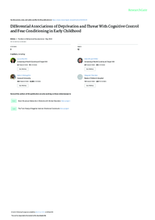Displaying 231 - 240 of 771
In a sample of 136 Romanian children from the Bucharest Early Intervention Project (BEIP), who were exposed to early psychosocial deprivation in the form of institutional care, the authors of this study examined caregiver-reported and observer-rated signs of disinhibited social engagement disorder (DSED).
According to UNICEF, nearly 90% of the world’s orphans have at least one living parent who cannot afford to safely care for them. The solution is family-based care.
This study investigated what factors are associated with an improvement in quality of life (QoL) during residential stay for children and adolescents living in youth welfare institutions in Switzerland.
The present open access study examines how deprivation (including institutionalization) and threat are associated with cognitive and emotional outcomes in early childhood.
The goal of this study was to examine whether and how alternative kinship structures were reproduced in Charitable Children’s Institutions (CCIs) in Kenya.
The objective of this research project was to profile the experiences of survivors abused in long-term child care in Scotland, and to develop a model which linked maltreatment, risk and protective factors, and outcomes.
In this study, working memory (WM) was examined during late childhood/adolescence as an intra-individual factor to mitigate the risk for separation anxiety, which is particularly susceptible to caregiving adversities, such as previous institutionalization (PI).
The objectives of this open access study were to investigate the association between parental visitation and depressive symptoms among institutionalized children in Japan, and to explore whether the established security of attachment interacts with that association.
This study, part of the Bucharest Early Intervention Project, compared the consequences of long-term high-quality foster care versus standard institution-based care which began in early childhood on cardiometabolic and immune markers assessed at the time of adolescence.
This article examines the tension between the rhetoric of children’s rights and the realities of residential care for children in Taiwan.

